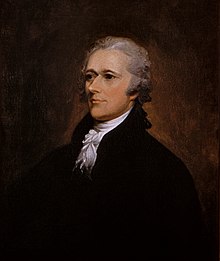
Back Alexander Hamilton Afrikaans ألكسندر هاميلتون Arabic الكسندر هاميلتون ARZ Alexander Hamilton AST Aleksandr Hamilton Azerbaijani الکساندر همیلتون AZB Аляксандр Гамільтан Byelorussian Александър Хамилтън Bulgarian Alexander Hamilton Bislama আলেকজান্ডার হ্যামিল্টন Bengali/Bangla
Alexander Hamilton | |
|---|---|
 | |
| 1st United States Secretary of the Treasury | |
| In office September 11, 1789 – January 31, 1795 | |
| President | George Washington |
| Preceded by | Position established |
| Succeeded by | Oliver Wolcott Jr. |
| Senior Officer of the United States Army | |
| In office December 14, 1799 – June 15, 1800 | |
| President | John Adams |
| Preceded by | George Washington |
| Succeeded by | James Wilkinson |
| Delegate to the Congress of the Confederation from New York | |
| In office November 3, 1788 – March 2, 1789 | |
| Preceded by | Egbert Bensonor |
| Succeeded by | Seat abolished |
| In office November 4, 1782 – June 21, 1783 | |
| Preceded by | Seat established |
| Succeeded by | Seat abolished |
| Personal details | |
| Born | January 11, 1755 or 1757 Charlestown, Nevis, British Leeward Islands |
| Died | July 12, 1804 (aged 47 or 49) New York City, New York |
| Resting place | Trinity Church Cemetery |
| Political party | Federalist |
| Spouse(s) | |
| Children | Philip Hamilton Angelica Hamilton Alexander Hamilton Jr. James Alexander Hamilton John Church Hamilton William S. Hamilton Eliza Hamilton Holly Philip Hamilton (the second) |
| Parents | James A. Hamilton Rachel Faucette |
| Education | King's College (renamed Columbia) |
| Signature | |
| Military service | |
| Allegiance | |
| Branch/service | |
| Years of service | 1775–1776 (Militia) 1776–1781 1798–1800 |
| Rank | |
| Commands | U.S. Army Senior Officer |
| Battles/wars | American Revolutionary War • Battle of Harlem Heights • Battle of White Plains • Battle of Trenton • Battle of Princeton • Battle of Brandywine • Battle of Germantown • Battle of Monmouth • Siege of Yorktown Quasi-War |
Alexander Hamilton (January 11, 1755 – July 12, 1804) was a statesman, a political theorist and an economist. He was one of the Founding Fathers of the United States. Hamilton was the United States' first Secretary of the Treasury. He was known for the creation of a national bank. Born on the island of Nevis in the Caribbean, Hamilton moved to New York City. When the American Revolutionary War started, Hamilton served in the Continental Army. He was a close aide to General George Washington. After leaving the military he started a bank. He was one of the framers of the United States Constitution. Along with James Madison and John Jay, he wrote the Federalist Papers, which supported the new Constitution.
Hamilton became the Secretary of the Treasury under George Washington. He helped set up the United States' financial system. Hamilton supported a national bank as well as the funding of the national debt. A leader of the Federalist Party, he was a long time rival of Thomas Jefferson. He was killed in a duel with political rival Aaron Burr, who was one of his first friends, in 1804.
Today, Hamilton is usually thought of as one of the most important of the early leaders. Hamilton's portrait appears on the United States ten-dollar bill.